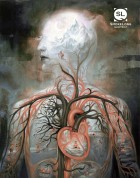So this is the kind of story that makes me wonder how the human race has persisted, because we’re never paying attention to each other, are we? I was immediately curious if there was an image or a line that inspired this flash.
Wow, that’s a good, terrifying point! I find myself often writing about how people don’t communicate with one another—being either unwilling or unable to say what it is they need.
This flash piece grew out of the image of the hiker’s boots peeking out of the snow. I’d done some reading about Mount Everest—hikers that die on the mountain and how dangerous it is to remove their bodies. Because of the expense and risk to the rescuers, some families choose to leave their loved ones’ bodies on the mountain. There was a particular grief and loneliness that spoke to me as I envisioned next year’s hikers navigating the fallen hikers. And the people left behind. The characters and the situation in my flash piece grew out of that image.
Ah, I love that! Do you usually write flash? How would you define flash? (I ask because I’m hard-pressed to put it into words myself.)
I’ve come to write flash more recently—I used to tend toward much longer stories. A few years ago, I started writing prose poems, and I think writing flash fiction is, for me, some kind of bridge between a prose poem and the much longer stories I’m used to writing. The (mostly) accepted definition for flash is fiction of 1,000 words or less, though I agree that’s not particularly useful in thinking about flash’s essence. I like to think of it as illuminating a moment—a single breath, really. When I sit down to write, I’m not aiming for a particular length or kind of story—I try to let the story guide me. In this story, I wrote that final image, and I just knew that’s where it had to end. Sure, I could write these whole characters’ lives, but there is power in this small moment. It’s like a flamethrower, instead of a slow burn.
I thought there was a whole world in the words that went unspoken in your dialogue, a whole backstory of this couple without ever doing a classic flashback. I’m a bit of an eavesdropper, always listening to strangers on public transportation. How do you approach dialogue?
I do the same thing! Sometimes, if it’s really good, I’ll make notes in my phone so I don’t forget.
I still remember a teacher who cautioned us not to rely too heavily on dialogue, so I always have that in the back of mind. When I do write dialogue, I’m striving to use it to reveal something about my characters, not simply to advance the plot or explain something. The way we talk to one another (and what we do and don’t say) is so fascinating and telling! I also took some playwriting courses when I was in college, which requires a very different set of skills, but I think it also gave me an ear for dialogue—I usually read my work aloud to myself, to make sure the dialogue sounds natural.
I do that, too. Sometimes I record myself and then I can hear all the problems. Can you name your influences? I know everything we read makes an impression, but are there any that stand out for you?
Alice Munro. I think because she taught me there are no actual rules in fiction—you can switch POVs, you can do a flash-forward, you can really do anything you want. I also looked to her when I was thinking about my own writing style, which always felt so simple, like I wasn’t playing around with language enough. But then I found this: There’s this CBC interview from 1978, where the interviewer commented on her lack of style, and she said, “What I have as an ideal is something so clear, as if you’re looking through perfectly clean water, so that the words don’t get between the reader.” I love that. It gave me freedom to not worry about if my language was “beautiful” enough. It gave me freedom to focus on character and emotion and for that to be enough. Not that I don’t enjoy reading beautiful sentences! But there has to be something more behind them.
There are certainly other writers who have influenced me, but none so deeply as her.


